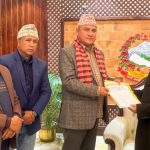
Ex-U.N. Official Urges Japan: Challenge China’s Seafood Ban at WTO

Japan should take China to the World Trade Organization over Beijing’s decision to ban imports of Japanese fishery products following the release of treated radioactive water from the crippled Fukushima nuclear power plant, a former senior U.N. official believes.
Japan could file a complaint with the WTO as a “tactical move” to induce China to end the punitive action Tokyo says is not based on scientific grounds, argues Kiyotaka Akasaka, a former undersecretary-general for communications and public information.
Akasaka also suggests Prime Minister Fumio Kishida and new Foreign Minister Yoko Kamikawa further address the safety of the water discharge from the Fukushima No. 1 nuclear plant in northeastern Japan during a series of U.N. General Assembly meetings this week in New York to broaden international understanding.
“Even after lodging a formal complaint with the Geneva-based U.N. trade watchdog, Tokyo can still negotiate with Beijing because bilateral talks constitute the basis of the WTO dispute settlement mechanism,” he said in a recent interview.
Akasaka handled issues involving the General Agreement on Tariffs and Trade, the precursor of the WTO, including a stint to the then-GATT Secretariat in Geneva, when he served at the Japanese Foreign Ministry.
“Some people say bringing the case to the WTO could provoke Beijing and complicate the issue. But I believe Japan can do it as a tactical move to put pressure on China,” he said. “I don’t think China wants to dispute the issue with Japan at the WTO.”
“Japan should continue negotiations with China bilaterally and use multilateral platforms such as the WTO to let Beijing better understand how isolated the country is on this issue, which we saw during Association of Southeast Asian Nations-related summits in Jakarta and the Group of 20 summit in New Delhi earlier this month,” Akasaka said.
Kishida may have a chance to address the issue directly with Chinese President Xi Jinping if they can arrange a meeting on the sidelines of an Asia-Pacific Economic Cooperation summit slated for November in San Francisco.
Bilateral relations soured sharply after China imposed the ban following the first release of what Beijing labeled “nuclear-contaminated water” into the Pacific Ocean on Aug. 24 by Tokyo Electric Power Company Holdings, operator of the Fukushima plant.
China took the measure even after the International Atomic Energy Agency concluded in July, after a two-year safety review, that the treated water discharge “will have a negligible radiological impact on people and the environment.”
The amount of tritium, a radioactive material contained in the treated water to be released annually from the Fukushima plant, is about one-tenth of the amount of tritium discharged from Qinshan Nuclear Power Plant in China, according to the Japanese government.
IAEA Director General Rafael Grossi said last week the independent sampling and monitoring from the Vienna-based U.N. nuclear watchdog has confirmed tritium levels in water discharged from the Fukushima plant were below Japan’s limit, and that the IAEA will continue to monitor the seawater.
However, the Chinese Foreign Ministry dismissed the IAEA’s monitoring as being “neither international nor independent,” and said, “Japan should immediately stop shifting the risks of nuclear pollution to the whole world.”
Akasaka, currently president of the Nippon Communications Foundation, operator of the nippon.com multilingual information service about Japan, questioned Beijing’s disregard for the authority of the IAEA.
“China says that as a permanent member of the Security Council, it attaches great importance to the United Nations. If that is true, Beijing must not undermine the authority of the U.N. system, but what the country is doing is totally the opposite,” he said.
“I wonder what would happen if accidents occurred at nuclear power plants in China,” Akasaka said. “Wouldn’t Beijing consult with the IAEA and seek the agency’s authorization for safety (reasons)?”
-The Japan Times












Comments